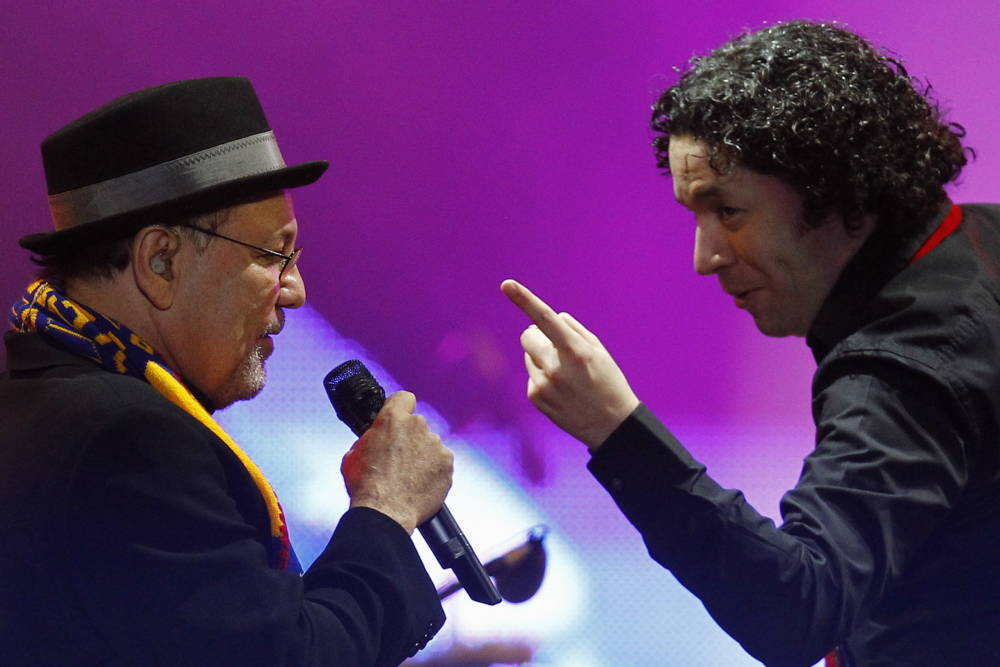Gustavo Dudamel, the young conductor of the Los Angeles Philharmonic Orchestra and the Simón Bolivar Symphony Orchestra of Venezuela, and the man on whom Amazon has loosely based its new comedy series “Mozart in the Jungle,” is the closest thing to a rock star that the classical music world has seen in many a year.
Dudamel emerged from poverty as a product of Venezuela’s El Sistema, founded in 1975 by José Antonio Abreu to use classical music as a means to rescue children of the slums from a life of crime and drug abuse. It has worked so well that it has been imitated in many countries, including most recently in Haiti. The Portland String Quartet is one of the ensembles that have helped with the educational aspects of the system.
Abreu once said, “I found insidious the situation whereby access to music had become the privilege of the elite. The more I had studied Beethoven the man as well as the composer, the more I realized how outraged he would be by such a situation. Beethoven was a man of profound democratic humanism, and thus I set out to create a means whereby music could be a way of vindicating the rights of the masses.”
I was fortunate enough to hear Dudamel and the Bolivar live at the Teatro Colón in Buenos Aires in 2013. Their performance of Stravinsky’s “The Rite of Spring” had been sold out months in advance, but I was able to share a box with a gentleman from Patagonia whose father had studied engineering at the University of Maine. He had brought his entire family to Buenos Aires for the event.
That “Rite of Spring,” played by a huge orchestra of El Sistema graduates, was simply the best I have ever heard, live or recorded. But the remarkable aspects of the concert didn’t end there.
Dudamel coupled it with a work by a Mexican composer, “La Noche de los Mayas” by Silvestre Revueltas, that revealed intriguing similarities to the Stravinsky, and also brought the house down. In Argentina there are no restrictions on cell-phone photographs at concerts (or in museums) and the rows of seats in the orchestra section looked like a field full of fireflies. After an uproarious standing ovation, he proceeded to play not one but four encores, something I have never witnessed from any other orchestra. I never found out if the encores had been rehearsed, whether the orchestra members had scores or played by memory alone, but the quality of musicianship never faltered.
After the concert and encores, Dudamel posed for photographs with various orchestra members, most of them seemingly personal friends who had also come up through the ranks of El Sistema.
From what I have read, combined with the experience at Teatro Colón, I have the impression that Dudamel obtains his spectacular results through the ability to communicate his enthusiasm for the music. He obviously knows exactly what he wants from the orchestra and gets it, without being a dictator or a martinet, like many famous maestros. Arturo Toscanini comes to mind, or Herbert von Karajan, two conductors whose names used to be household words when the classical recording industry was in full flower.
Toscanini, director of the NBC Symphony Orchestra from 1937 to 1954 was certainly the most famous conductor, instantly recognizable to most of the population of the United States because of NBC’s relentless promotion. He was on the cover of Time Magazine three times. I used to stand in line to buy his latest recordings, some of which were disappointing.
What concerns me about the new TV series is that it will concentrate on ancillary matters – affairs, gossip, romance, office intrigue and the like – instead of the music. In El Sistema, classical music is everything. As one student from the barrio told a Guardian reporter several years ago, “It’s much cooler to like Strauss than salsa.”
But, what Joseph Brodsky said about poetry also applies to music: “Poetry is not a form of entertainment and in a certain sense not even a form of art, but it is our anthropological, genetic goal, our evolutionary, linguistic beacon.” If it takes a soap opera or a sitcom to bring one person to it, then “Mozart in the Jungle” will have served its purpose.
Christopher Hyde is a writer and musician who lives in Pownal. He can be reached at:
classbeat@netscape.net
Copy the Story LinkSend questions/comments to the editors.



Success. Please wait for the page to reload. If the page does not reload within 5 seconds, please refresh the page.
Enter your email and password to access comments.
Hi, to comment on stories you must . This profile is in addition to your subscription and website login.
Already have a commenting profile? .
Invalid username/password.
Please check your email to confirm and complete your registration.
Only subscribers are eligible to post comments. Please subscribe or login first for digital access. Here’s why.
Use the form below to reset your password. When you've submitted your account email, we will send an email with a reset code.